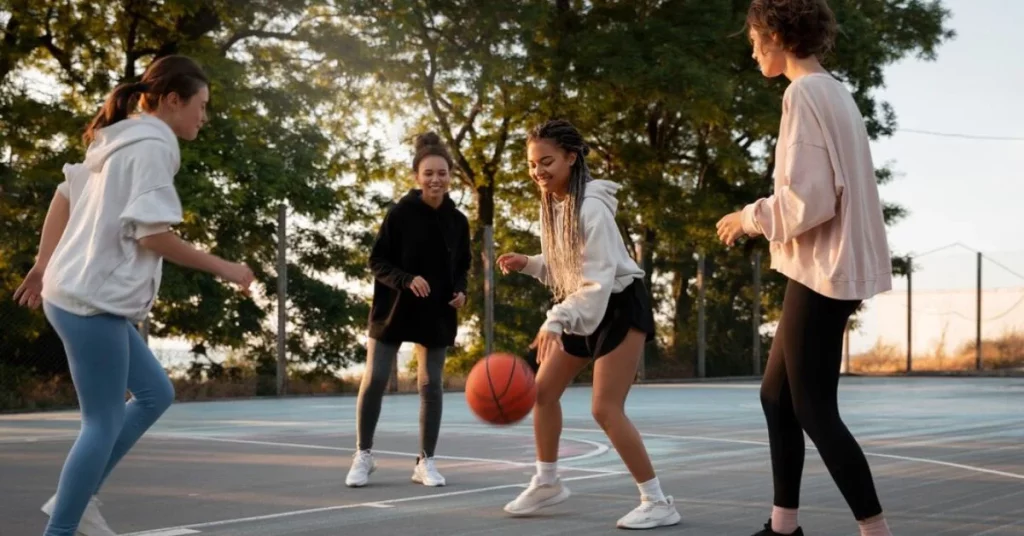Basketball, a sport that thrives on teamwork, skill, and strategy, has seen a significant rise in the popularity of group training sessions. This article delves into the world of group basketball training, exploring its benefits, key considerations, and the crucial elements that make it effective.
Introduction
Definition of Group Basketball Training
Group basketball training refers to organized coaching sessions involving multiple players. It focuses on enhancing individual skills within a team context, fostering camaraderie and competitive spirit.
Growing Popularity
With the increased recognition of the value of skill development, group training has become a preferred choice for players of all levels.
Importance of Skill Development in Basketball
The foundation of a successful basketball team lies in the proficiency of its individual players. Group training aims to elevate the skill set of each participant, contributing to the overall strength of the team.
Benefits of Group Basketball Training
Team Building
Group sessions promote teamwork and collaboration, fostering a sense of unity among players.
Individual Skill Enhancement
Participants get personalized attention, honing their skills under the guidance of experienced coaches.
Competitive Edge
The dynamic nature of group training prepares players for the fast-paced and unpredictable nature of real games.
Motivation and Camaraderie
Training in a group setting creates a supportive environment, motivating players to push their limits and build strong bonds with teammates.
Choosing the Right Group Training Program
Research and Reviews
Thorough research and reviews help in selecting a program with a proven track record.
Trainer Expertise
A qualified and experienced trainer is essential for effective skill development.
Customization for Skill Levels
An ideal program caters to participants with varying skill levels, ensuring personalized growth.
Facility and Equipment
The availability of quality facilities and equipment contributes to a positive training experience.
Structured Sessions and Drills
Warm-up and Stretching
Proper warm-up routines reduce the risk of injuries and prepare players for intensive drills.
Skill-Specific Drills
Structured drills target specific skills, focusing on both offensive and defensive aspects of the game.
Game Situations and Strategies
Simulating real game scenarios enhances decision-making and strategic thinking.
Cool-down and Reflection
Cool-down sessions and reflections help players absorb the lessons learned during the training.
Perplexity in Training
Varied Drills and Scenarios
Introducing a variety of drills and scenarios keeps players on their toes, enhancing adaptability.
Adaptability to Game Dynamics
Players learn to adapt quickly to changing game dynamics, preparing them for actual match situations.
Mental Challenges
Incorporating mental challenges ensures players develop not only physical but also mental resilience.
Burstiness in Training
High-Intensity Drills
High-intensity drills simulate the fast-paced nature of basketball games, improving players’ speed and agility.
Fast-Paced Scenarios
Training at a fast pace prepares players to make split-second decisions during matches.
Simulation of Game Speed
Bursty training replicates the speed of real games, allowing players to develop a quicker response time.
Maintaining Specificity and Context
Focus on Individual Player Needs
Customizing training sessions addresses individual weaknesses, maintaining specificity.
Contextual Skill Application
Ensuring that skills learned are applicable to real game situations retains context in training.
Avoiding Generic Approaches
Steering clear of generic methods ensures each player’s unique needs are addressed effectively.
Conversational Style in Training
Engaging Communication
Coaches employing a conversational style create a positive and interactive training environment.
Encouragement and Positive Reinforcement
Positive encouragement boosts player morale and fosters a growth mindset.
Building Rapport with Players
Establishing a connection with players builds trust and makes the training experience more enjoyable.
Personal Pronouns in Coaching
Building Player-Coach Connection
Using personal pronouns helps build a connection between coaches and players, creating a sense of unity.
Enhancing Communication
Clear communication facilitated by personal pronouns ensures players understand instructions effectively.
Creating a Supportive Environment
A supportive atmosphere is fostered when coaches use personal pronouns, making players feel valued.
Active Voice in Instructions
Clear and Direct Commands
Active voice in instructions ensures clarity and decisiveness, leaving no room for ambiguity.
Avoiding Ambiguity
Clear instructions eliminate confusion, enhancing players’ understanding and execution.
Enhancing Player Responsiveness
Active voice commands prompt quick responses, contributing to the overall effectiveness of the training.
Brief and Impactful Coaching
Avoiding Information Overload
Brief coaching sessions focus on key concepts, preventing information overload for players.
Focus on Key Concepts
Highlighting key concepts ensures players grasp and retain crucial elements of the training.
Encouraging Quick Decision-Making
Brief coaching encourages players to make quick decisions, a vital skill in fast-paced basketball games.
Rhetorical Questions in Training
Stimulating Critical Thinking
Rhetorical questions prompt players to think critically, enhancing their understanding of the game.
Encouraging Player Engagement
Engaging players through rhetorical questions keeps them actively involved in the training process.
Enhancing Learning Experience
A questioning approach enriches the learning experience, making training more interactive and memorable.
Analogies and Metaphors in Coaching
Simplifying Complex Concepts
Analogies and metaphors simplify complex basketball strategies, making them accessible to players.
Making Learning Enjoyable
Creative use of analogies adds an element of fun to the training, making it an enjoyable experience.
Creating Lasting Impressions
Memorable analogies and metaphors leave a lasting impact, aiding in the retention of valuable lessons.
Conclusion
Recap of Benefits
Group basketball training offers a multifaceted approach to skill development, fostering teamwork, individual growth, and a competitive edge.
Encouragement for Joining Group Basketball Training
For aspiring basketball players, joining a group training program is a stepping stone to realizing their full potential on the court.
Final Thoughts on Skill Development
Continuous skill development is the key to success in basketball, and group training provides a holistic platform for players to excel.
FAQs
How often should one attend group basketball training?
Attending group basketball training sessions 2-3 times a week is ideal for consistent skill development.
Are there age restrictions for participating in group sessions?
Most programs cater to various age groups, ensuring inclusive participation from youth to adults.
Can beginners join group basketball training?
Yes, beginners are welcome, and group training is an excellent way for them to build a strong foundation in the sport.
How long does a typical group training session last?
Sessions typically last between 60 to 90 minutes, ensuring a comprehensive and focused training experience.
What distinguishes group training from individual coaching?
Group training emphasizes teamwork, game scenarios, and competition, whereas individual coaching is tailored to personal skill development and specific player needs.







